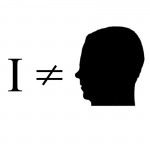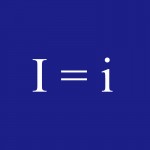 We are not Cartesian egos. We are not biological organisms either.
We are not Cartesian egos. We are not biological organisms either.
Not Cartesian egos
A Cartesian ego is a kind of mental or spiritual thing that is thought to inhabit a human body and give it life. Many people believe we can exist independently of a human body – that we survive the death of our bodies, continuing to have experiences either without a body, or by being reborn in another body.
I hardly need to argue against Cartesian egos. The idea is in widespread disrepute without any assistance from me. It is hard to reconcile with a scientific view of the world. We have no convincing evidence that such things exist. Until we have, we should use Occam’s Razor for its intended purpose to prune them from our conceptual scheme. Leaving them in creates clutter and awkward problems.
One problem comes from split brain research. When the corpus callosum connecting a patient’s two cerebral hemispheres is cut, two centres of consciousness appear where there was one before. Should we conclude that the surgeon’s knife divided a spiritual substance? Instead of deepening our understanding, this multiplies mysteries.
Despite its academic unrespectability, the idea that we are Cartesian egos is embraced by billions of people. It is deeply involved with emotion, as this passage from Umberto Eco’s novel The Mysterious Flame of Queen Loana illustrates:
One evening the spiritual director stood in front of the altar balustrade, illuminated – like all of us, like the entire chapel – by that single candle that haloed him in light, leaving his face in darkness. Before dismissing us, he told us a story. One night, in a convent school, a girl died, a young, pious, beautiful girl. The next morning, she was stretched out on a catafalque in the nave of the church, and the mourners were reciting their prayers for the deceased, when all of a sudden the corpse sat up, eyes wide and finger pointing at the celebrant, and said in a cavernous voice, “Father, do not pray for me! Last night I had an impure thought, a single thought – and now I am damned!” Continue reading “What We Are Not”
 What are we, if we are informational entities?
What are we, if we are informational entities?
 We are not Cartesian egos. We are not biological organisms either.
We are not Cartesian egos. We are not biological organisms either.